Arranging to Weave a Color Gamp
Deciding how to arrange the colors in a Color Gamp can lead to many enjoyable hours of planning, thinking and rearranging. The purpose of a color gamp is to see the interactions of the color in the weave structure. In a purely academic way, the way the colors are arranged in a color gamp doesn’t matter at all.
What Are You Going to Make?
Usually, a good beginning point of thinking about the color arrangement is to consider what is the purpose of the fabric. Often our color gamp warps provide us with fabric for multiple items: baby blankets, dinner napkins, shawls or clothing.
Think About Yellow:
When we design fabric that is intended for clothing, we are especially mindful about the placement of the yellow sections of the gamp. The bright yellows are beautiful but may draw too much attention to certain parts of the body if they end up there in a finished garment.
You can use this to your advantage too...notice how your eye travels around the back side of the shawl shown at the right, and how the yellow blocks up high help keep your eyes moving around the whole piece rather than settling just at the bottom where the yellow is the most concentrated.
Time to Play!
The best way to explore the options for arranging your colors are to put the cones from the Tubular Spectrum™ on the floor or a table and play! This can lead to many enjoyable hours as you contemplate how to arrange the colors for your gamp.
That is what we did when we came up with our favorite 3 options: (1) Around the Color Wheel, (2) Folded Rows, and (3) Alternating Rows.
Around the Color Wheel.
We often arrange the colors in the order they appear on the color wheel. This creates a gamp with soothing energy. Your eye travels easily from one color to the next, and it is easy to find the colors in the gamp when you are using it to plan color studies.
The major choice you have with this color arrangement is where to put the colors in the gamp. We often start with the Blue/Greens on the outside as it makes yellow and red toward the inside, but not centered. The two gamps shown here have the colors in slightly different places, and you can see how the gamps have a slightly different look.
Folded Rows
This arrangement is created by lining the cones up in order, and then ‘folding’ the line in half and merging the cones from the folded section back in between the original line. When you are done, the cones at the beginning of the original line will be next to cones from the end of the original line.
This makes a lively gamp, as you can see in the picture to the right. The colors on the corners are close to one another on the color wheel while the colors in the center are opposite one another.
The draft for this gamp is included in the 20-Color Gamp Kit for 20/2 yarn.
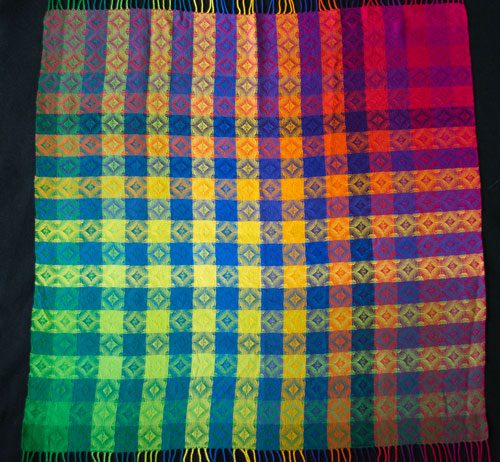
Alternating Rows
For this arrangement, line up the colors, then cut the line in half. Now, move the whole second half of the line in front of the first half so that the original middle color is now in front of the first color. Alternate colors between the two rows to make the color arrangement.
In this arrangement, all neighboring colors are near opposites on the color wheel. If you start with yellow on the outside, you will end up with a yellow/green border and a red/blue middle.
And to make your fabric a color gamp, regardless of how you set up your colors, weave the colors in the same order you threaded them. Then you will have a fabulous reference for planning your next project.
Whatever order you use to weave your color gamp, have fun. And let us know if you find something you really like! We’d love to hear about it!
Originally published February 2017.
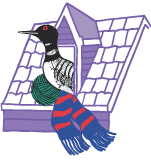

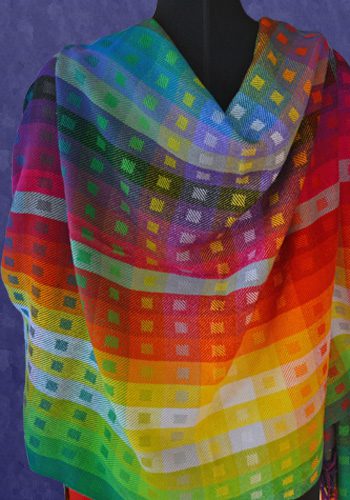
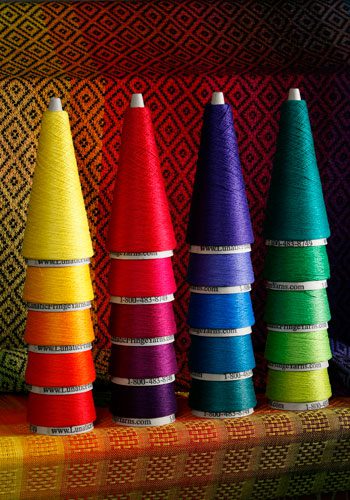
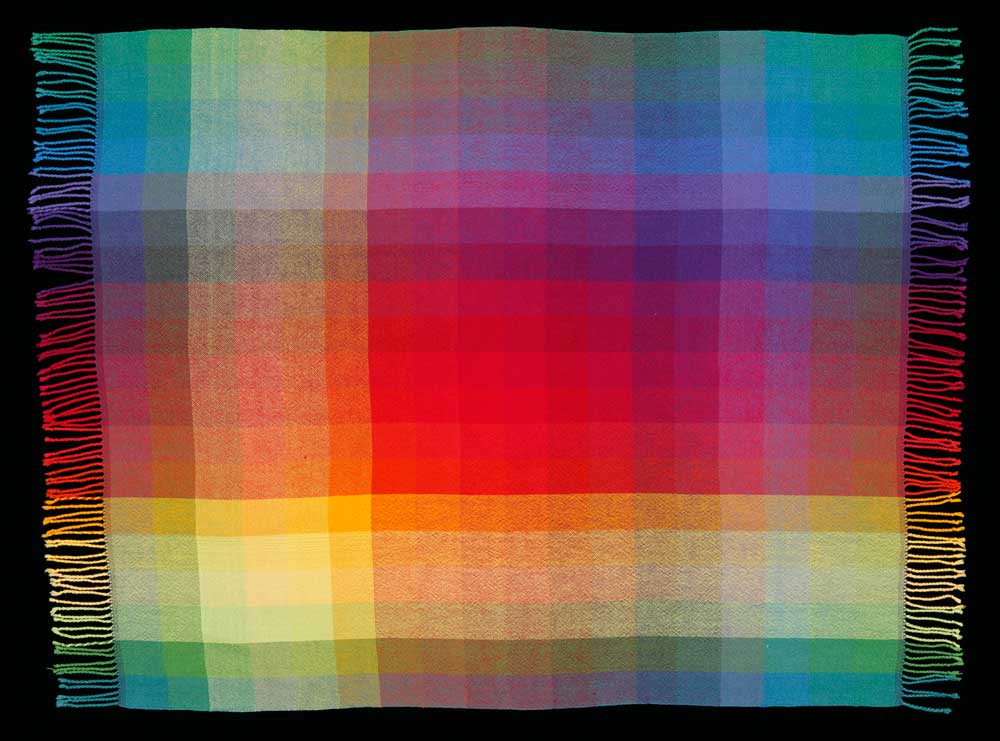
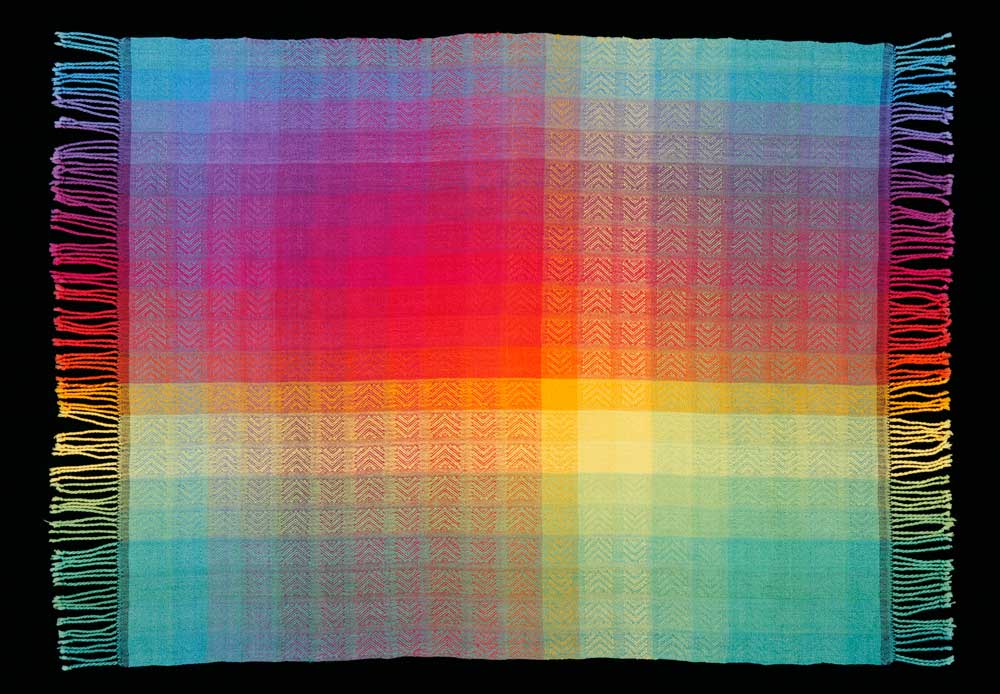
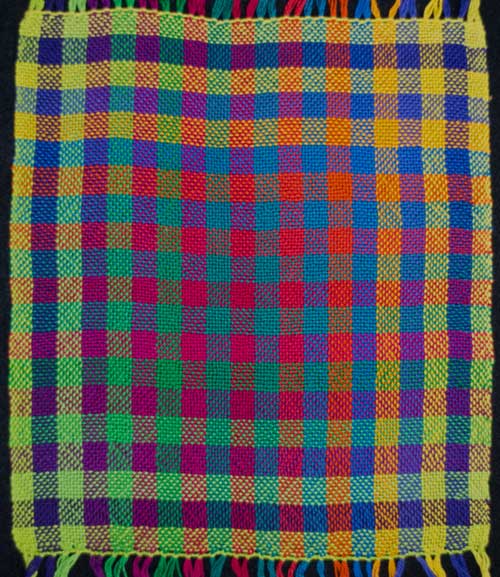
A unique design the color scheme which were used in the above scarves great and was such a beautiful idea
Love the photo of the double diamonds overshot for the gamp.
question. i have only woven traditional overshot – white background (thin) and color foreground (thick). how do i weave overshot in the gamp. i am having trouble wrapping my head / weft around this.
thanks, lisa ann
Great question! The Double Diamond overshot pattern in Marguerite Porter Davison’s A Handweaver’s Pattern Book (page 130) has 44 ends for the threading repeat. So, to make a colorful gamp, we threaded the loom with a striped warp using 20 colors of 10/2 yarn with 44 ends of each color. Then, when we wove the gamp, we again used the same 10/2 yarns for the tabby, and 5/2 black yarn for the pattern weft. Because it is a gamp, we wove one treadling repeat using each of the 20 colors for the tabby yarn in the same order that they are in the warp. The pattern weft was black through the whole gamp. The overall gamp color variation is subtle and tends to look more striped than blocky because the pattern weft draws your eye to the pattern before you see the tabby thread combinations.